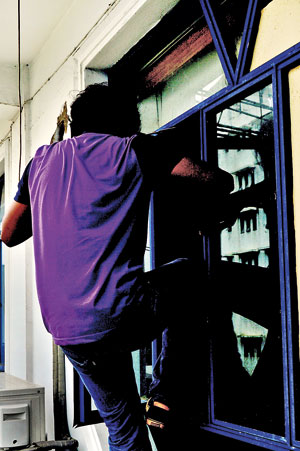News
Criminals able to strike at will, brazen burglary shows

According to these statistics, there were 16,116 reported cases of housebreaking and theft in 2013. That number had fallen to 15,050 in 2014
The brazen burglary of the house of former Inspector-General of Police (IGP) Victor Perera in Panadura this week showed that thieves can strike even places that are generally regarded as safe.
The thieves made off with jewellery and cash valued at nearly Rs. 1 million despite the house being guarded by security. Such incidents have raised concerns that the crime rate is on the increase and no one anywhere is safe.
Mr. Perera told The Sunday Times the jewellery had been collected earlier that day (Tuesday) by his wife from a bank as his family was due to attend a wedding the following morning. The jewellery belonged to his wife and two daughters.
He said his wife had kept the jewellery in a small bag along with about Rs. 50, 000 in cash under her pillow that night, thinking that was the safest place. The bedroom door had been open.
She was woken up by some strange noises in the early hours of the morning and found that someone had taken the bag from under her pillow. “Though she immediately raised the alarm, the thieves had already managed to escape,” Mr Perera said.
He said a security officer had been on duty at the time of the incident but had been based at the front of the house. It is suspected that the thieves had gained entry from the back.
Police who arrived following a complaint lodged by the former IGP found the bag that had contained the jewellery tossed away in the grounds of an abandoned house next door. It had been emptied of its contents. Also found at the scene was a pair of slippers suspected to have belonged to the thief or one of the thieves who carried out the robbery.
While he is not certain as to who carried out the robbery, Mr. Perera said the level of knowledge exhibited by the thieves indicates they were familiar with the layout of the house and might have also been aware that a stock of jewelry was being kept there that night.
An officer from the Crime Branch of the Panadura Police said investigations were still ongoing regarding the robbery. No suspects have so far been arrested.
A comparison of police “Grave Crime Abstracts” for 2013 and 2014 – the latest statistics available regarding crime trends – reveal that the number of the most serious crimes, including housebreaking and robberies, have decreased.
According to these statistics, there were 16,116 reported cases of housebreaking and theft in 2013. That number had fallen to 15,050 in 2014. The number of robberies has likewise decreased, with 4,743 reported cases in 2013 falling to 4,235 the following year. Police have long maintained that there is no “crime wave” in the country and that most crimes have gradually decreased over the years. Statistics do seem to back up this claim.
What has changed, however, is the nature of the crimes, their brazenness and increasingly, the potential for violence. There have been multiple occasions where a housebreaking attempt has ended with one or more of the inmates of the house being murdered by thieves who were fearful that they might be identified.
Professor M.W. Jayasundara of the Department of Criminology, University of Sri Jayewardenepura said there were two driving factors behind such crimes: economic pressure and professional thieves.
“We are gradually moving from an agricultural society to an industrial one. This is an enormous social change and the pressures exerted due to this can be immense,” he observed.
Prof. Jayasundara said the situation is described in “Modernisation theory” where it is argued that the nature of crime tends to change during times of economic hardship. “The fact that we are increasingly seeing women being engaged in theft is part of this. They have had to take charge and in some cases, the economic pressure has forced them to commit such acts,” he said.
He also pointed out that disaffected youths, who are either unemployed or are eager to live the consumerist lifestyle they encounter every day, are being pressured into engaging in illegal acts such as cybercrime.
Both men and women who engage in acts of theft sometimes go onto become professional thieves, he noted.
The academic cautioned that if economic hardship persisted, it would only drive more people to crime. “In certain Western countries, there are welfare programs for the unemployed, retirement schemes for the employed and counselling facilities. We just don’t have such an effective system,” he pointed out.
Prof. Jayasundara said there was no point in talking about crime trends without taking constructive steps to prevent people from taking to a life of crime out of desperation. “There’s no use in talking about crime and punishment without looking into the underlying issues. Unfortunately, those in positions of power don’t understand this fact,” he lamented.

